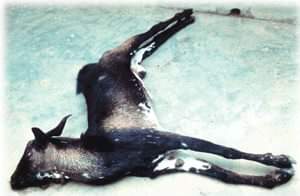Successful Treatment of Tetanus in a ND Goat – a case report
Tetanus – is a infectious disease caused by the Toxins produced by the Gram +ve organism Clostridium tetani , characterized by spasmodic contractions of Skeletal muscles.
Occurrence :
Most commonly occurs in lambs, kids, calves and rarely occurs in adult animals.
Pathogenesis :
The Spores of Clostridium tetani are commonly prevalent in soil, get entry into the animals through wounds, germination of spores occurs in anaerobic environment, produces toxins which causes spasmodic contractions and Stiffness of all Skeletal muscles prominently in masseter muscles ( Muscle of maximum activity in ruminants ) leading to Wooden Horse appearance and Lock Jaw. Finally death occurs due to asphyxiation.
Prognosis :
In advanced cases, the prognosis is Guarded.
Present Study :
A Goat ( Doe ), Non-Descriptive, first Kidding, kidded 45 days back, having body weight of 25 kg, was presented with the Symptoms of Stiffness and Rigidity of all four limbs, neck ( unable to turn any direction ), unable to open mouth, Stiffness of Intercostal and Abdominal muscles and absence of Rumination. Defecation and Urination were normal in nature but, the frequency and quantity was reduced. Mild tympany of Rumen noticed. These symptoms were developed since 2 days. On observation, no external wounds were found. The animal is on Standing Posture and had restricted walkig with stiff gait.
Treatments followed :
Day – 1
· Liquid Paraffin-200ml intra-ruminally using 16G needle – for reducing tympany as well as for laxative effect to expel the Intestinal contents which may contain / favour organisms.
( Oral drenching was not possible due to Lock-Jaw )
· Inj. Normal Saline – 250 ml i/v – to dilute the circulating Toxins.
· Inj. Oxytetracycline LA – 2.5ml i/m & Inj. Benzathine Penicillin – 12 lac i/m – to control Bacterial multiplication & production of toxins.
· Inj. Flunixin – 50 mg i/v and Inj. Tribivet – 2.5 ml i/v – as anti-inflammatory, to control endotoxicosis and as Supporive therapy.
Day – 2 – Mouth could be opened partially. Mild improvement noticed
· Inj. Normal Saline – 250 ml i/v
· Inj. Tribivet – 2.5 ml i/v
· Bolus. Doloban Plus Vet ( Nimesulide-500mg, Paracetamol- 1500mg & Chlorzoxazone – a centrally acting Muscle Relaxant ) – 1/8 part of a Bolus administered orally .
Day – 3 – Modeartely improved, able to lying down and getting up.
· Inj. Normal Saline – 250 ml i/v
· Inj. Tribivet – 2.5 ml i/v
· Bolus. Doloban Plus Vet – 1/8 part of a Bolus administered orally .
Day – 4 – Rumination started, Mild feed & Water intake noticed.
· Inj. Oxytetracycline LA – 2.5ml i/m
· Inj. Benzathine Penicillin – 12 lac i/m
· Inj. Normal Saline – 250 ml i/v
· Inj. Tribivet – 2.5 ml i/v
· Bolus. Doloban Plus Vet – 1/8 part of a Bolus administered orally .
Day – 5 – Animal improved Well
· Inj. Normal Saline – 250 ml i/v
· Inj. Tribivet – 2.5 ml i/v
· Bolus. Doloban Plus Vet – 1/8 part of a Bolus administered orally .
Day – 6
· Repated Treatments of day – 5
Day – 7
· Repated Treatments of day – 5
From 8th Day, the health of the animal was near normal and complete recovery noticed on 11th day .
Conclusion :
Tetanus in early stages ( while on standing posture ) can be treated with the above mentioned treatment protocol and Chlorzoxazone is doing a great action to relax the contracted stiff skeletal muscles.
Contributed By, Dr.Pon.Dhanavel, B.V.Sc., Veterinary Assistant surgeon, Veterinary Dispensary, Kabilarmalai, Namakkal Dt. TamilNadu, INDIA



